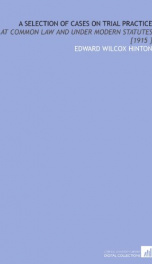a selection of cases on the law of pleading under modern codes

Purchase of this book includes free trial access to www.million-books.com where you can read more than a million books for free. This is an OCR edition with typos. Excerpt from book: So far as the tort itself goes, an executor shall not be liable, and therefore it is that all public and all private crimes die with the offender, and the executor is not chargeable; but so far as the act of the offender is beneficial, his assets ought to be answerable, and his executor therefore shall be charged. There are express authorities that trover and conversion does not lie against an executor. I mean, where the conversion is by the testator. Sir William Jones, 173-4, Palmer, 330. There is no saying that it does. The form of the plea is decisive, viz., that the testator was not guilty; and the issue is to try the guilt of the testator. And no mischief is done; for so far as the cause of action does not arise ex delicto, or ex maleficio of the testator, but is founded in a duty, which the testator owes the plaintiff, upon principles of civil obligation another form of action may be brought, as an action for money had and received. Therefore, we are all of the opinion that the judgment must be arrested. Per Cur. Judgment arrested. McDERMOTT v. MORRIS CANAL CO. 38 N. J. L., 53. [1875.] The opinion of the court was delivered by Knapp, J.: To the declaration filed in this cause, the defendants interposed a general demurrer. The first and second counts of the declaration are in tort, and set forth a cause of action in form and substance essentially the same. They charge that the plaintiffs, being the owners of a mill near to a certain stream in the County of Warren, were entitled to have, and for a long time had a portion of the water from said stream flow through a certain flood-gate or sluice-way, to the plaintiff's mill, for running it, and the defendants unlawfully pulled down a stop-gate placed in the stream for the purpose of turning the water to the mi... --This text refers to the Paperback edition.
Info about the book
Author:
Series:
Unknown
ASIN:
B008BTFEL2
Rating:
4.5/5 (2)Your rating:
0/5
Languge:
English
Users who have this book
Users who want this book
What readers are saying
What do you think? Write your own comment on this book!
write a commentif you like a selection of cases on the law of pleading under modern codes try:
Do you want to exchange books? It’s EASY!
Get registered and find other users who want to give their favourite books to good hands!



